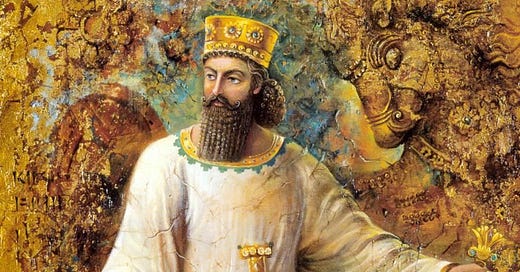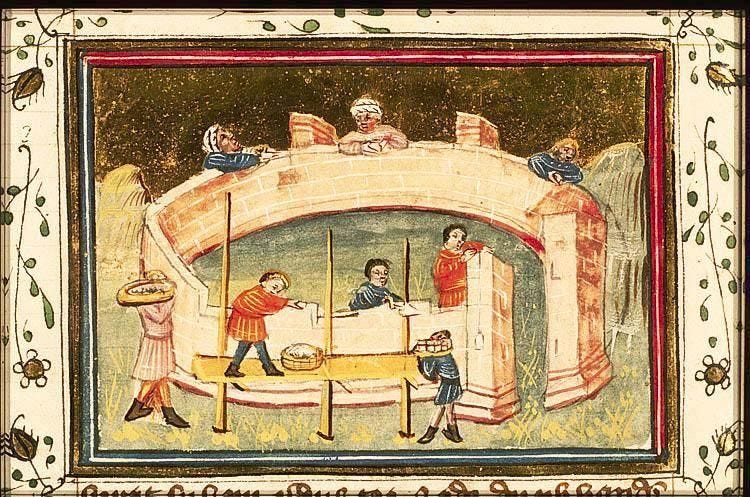Too Blessed To Fail: When Cyrus defeated Babylon, both Marduk and Yahweh took credit
Cyrus' victory had two Godfathers, and led to Israel's return from exile
“The Lord, the God of heaven, has given me all the kingdoms of the Earth and he has appointed me to build a temple for him at Jerusalem in Judah. Any one of the people among you — may his God be with him, and let him go up to Jerusalem in Judah and build the temple of the Lord, the God of Israel, the God who is in Jerusalem.” — Cyrus of Persia, in Ezra 1:2-4
John F. Kennedy probably wasn’t thinking about Cyrus of Persia when he said “victory has 1,000 fathers, but defeat is an orphan.” He had more immediate matters at hand, such as the failed Bay of Pigs invasion in Cuba that he was referencing.
But the sentiment applies to Cyrus just the same.
When Cyrus defeated Babylon in 539 B.C., he returned Israel home from its Babylonian exile, and immediately announces plans to rebuild the destroyed temple.
A version of the Cyrus story is told in two ancient Near Eastern sources: The Bible, in the book of Ezra, and the Cyrus Cylinder, an Akkadian account.
Cyrus was not Babylonian, but is depicted in the Cyrus Cylinder as being sent by Marduk, God of the Babylonians, to punish an unfaithful people. Sound familiar?
The Babylonian leader Cyrus defeated, Nabonidus, has lost his “reverential fear” of the Marduk, and Marduk began seeking his replacement, according to the Cylinder.
Covenant is not unconditional love. It’s a menu of terms and conditions.
Cyrus was not an Israelite, but is depicted in the Bible as being sent by Yahweh, God of Israel, to restore his people to their homeland.
Isaiah 44 calls Cyrus God’s “shepherd,” who will “accomplish all that I please.” Isaiah 45 depicts God as taking hold of Cyrus’s right hand “to subdue nations before him,” and says God will “go before him.”
That’s Old Testament-speak for “guaranteed victory.”
Cyrus even makes it a priority to rebuild the temple, and is allowed to do so.
This is important. In 1 Chronicles 17, King David was denied by God the honor of building the first temple, because he was a man of war.
Cyrus’s only relationship to Israel owed to a war he won. Neither the bloodshed nor his foreign heritage, neither were a barrier to repatriating Israel and rebuilding God’s house.
Cyrus’ victory had two God-fathers. It was backed by the most powerful gods of the ancient world. Cyrus was Too Blessed To Fail.
As Enid B. Mellor writes in “The Making of the Old Testament”:
“The events recorded by the Cyrus Cylinder and the Old Testament are substantially the same, but the religious interpretations placed upon them are very different. The Jews saw their repatriation as the liberation of a subject people, the fulfillment by Yahweh’s agent of Yahweh’s promise.
Cyrus, on the other hand, would have in mind his responsibilities to the whole of his newly-acquired territories and the need for propaganda which would dispose in his favor the Babylonians from whom these territories had been acquired.
It was not surprising that in each case the literary result was the product of its own environment and couched in its own terms.”
The Cyrus Cylinder says the Persian “repaired the ruined temples in the cities he conquered, restored their cults, and returned their sacred images as well as their former inhabitants, which Nabonidus had taken to Babylon.”
The Cylinder does not mention Israel, but Israel was one such cult.
In Ezra, one of Cyrus’ first priorities is the rebuilding of the temple.
Babylon had betrayed Marduk, and so Marduk brought Babylon low.
If it took a foreigner, so be it.
Israel had been in exile longer than it had been in exodus. To return home took a massive geopolitical event. It took a great battlefield success — and not by Israel’s own hands.
If it took a foreigner, so be it.
But it took more than that. It took the kind of ruler willing to restore a people to their homeland, and also to their God to his home.
It took Cyrus, with Marduk and Yahweh going before him.







I hate to read the god Marduk taking credit along side the Lord God's work. Isaiah 44 is a chapter about the foolishness of worshiping false gods. There is only one God, Isaiah 44:6.
I see Cyrus as a leader whose political aspirations were used by God to bless His people.
"The king's heart is in the hand of the Lord, as the rivers of water, he turns it wheresoever he will." Prov 21:1. Marduk is not a Godfather, but a false God worshipped by the Babylonians, one of thousands they worshiped. Babylonians witnessed the restoration of Israel and needed an explanation, likely a priest wrote the account from their own historical perspective, but it proves out the Bible's account.